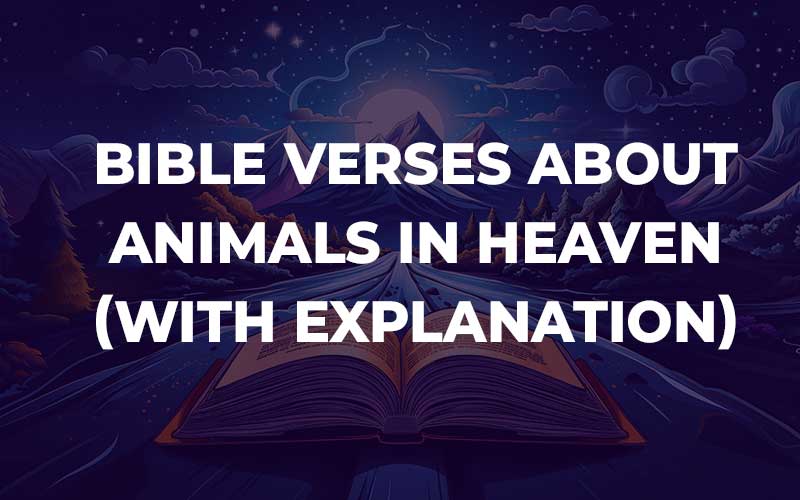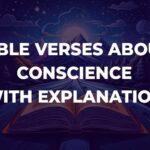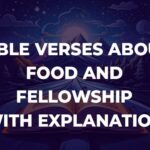The question of whether animals go to heaven has intrigued many believers. While the Bible does not provide a direct answer, it does offer insights into God’s care for all of His creation, the role of animals in the divine plan, and the restoration of all things in the new heavens and new earth. These verses explore the nature of God’s creation, His love for animals, and the hope of a renewed creation. Here are 30 Bible verses that touch on these themes, with each verse followed by a brief commentary.
1. Isaiah 11:6
“The wolf will live with the lamb, the leopard will lie down with the goat, the calf and the lion and the yearling together; and a little child will lead them.”
This verse from Isaiah presents a vision of peace and harmony in God’s future kingdom, where even natural enemies coexist peacefully. It suggests that in the new creation, animals will play a role in the restoration of harmony and peace, reflecting God’s original intent for His creation.
2. Romans 8:19-21
“For the creation waits in eager expectation for the children of God to be revealed. For the creation was subjected to frustration, not by its own choice, but by the will of the one who subjected it, in hope that the creation itself will be liberated from its bondage to decay and brought into the freedom and glory of the children of God.”
Paul speaks of creation’s longing for redemption. This passage teaches that all of creation, including animals, is eagerly awaiting the time when it will be restored and freed from the effects of sin. This hints at the possibility that animals could share in the renewal of all things in the new heavens and new earth.
3. Revelation 5:13
“Then I heard every creature in heaven and on earth and under the earth and on the sea, and all that is in them, saying: ‘To him who sits on the throne and to the Lamb be praise and honor and glory and power, for ever and ever!'”
John’s vision includes all creatures worshiping God. This verse suggests that all of creation, including animals, has a role in the eternal worship of God. It points to the idea that animals could have a place in the eternal kingdom, joining in the praise of their Creator.
4. Ecclesiastes 3:21
“Who knows if the human spirit rises upward and if the spirit of the animal goes down into the earth?”
The writer of Ecclesiastes ponders the fate of animals. This verse reflects on the mystery of what happens to the spirits of animals after death. While it raises questions rather than providing answers, it acknowledges that the destiny of animals is something that God alone knows.
5. Genesis 1:25
“God made the wild animals according to their kinds, the livestock according to their kinds, and all the creatures that move along the ground according to their kinds. And God saw that it was good.”
This verse highlights God’s creation of animals and His declaration that they are good. It teaches that animals are part of God’s good creation, valued and loved by Him. This intrinsic value could suggest that animals have a place in God’s eternal plan.
6. Isaiah 65:25
“The wolf and the lamb will feed together, and the lion will eat straw like the ox, and dust will be the serpent’s food. They will neither harm nor destroy on all my holy mountain,’ says the Lord.”
Isaiah describes a future of peace and restoration. This verse reinforces the idea of a future where animals live in harmony, no longer preying on one another. It suggests that in God’s restored creation, the natural order will be transformed, reflecting peace and non-violence.
7. Psalm 36:6
“Your righteousness is like the highest mountains, your justice like the great deep. You, Lord, preserve both people and animals.”
The psalmist speaks of God’s care for both humans and animals. This verse teaches that God values and preserves animal life, just as He does human life. It implies that God’s care for animals might extend into eternity, where they could be preserved in the new creation.
8. Hosea 2:18
“In that day I will make a covenant for them with the beasts of the field, the birds in the sky and the creatures that move along the ground. Bow and sword and battle I will abolish from the land, so that all may lie down in safety.”
God promises a covenant of peace with all creatures. This verse suggests that in the future, God will establish peace not only among humans but also with animals, indicating that they have a place in His covenant and could be included in the restored creation.
9. Job 12:10
“In his hand is the life of every creature and the breath of all mankind.”
Job acknowledges God’s sovereignty over all life. This verse teaches that the life of every creature, including animals, is held in God’s hands. It suggests that animals are part of God’s plan and that their lives are precious to Him, possibly extending into eternity.
10. Genesis 9:9-10
“I now establish my covenant with you and with your descendants after you and with every living creature that was with you—the birds, the livestock and all the wild animals, all those that came out of the ark with you—every living creature on earth.”
God includes animals in His covenant with Noah. This verse teaches that God’s covenant after the flood included not only humans but also animals. It suggests that animals are part of God’s covenant relationship and could have a role in the eternal kingdom.
11. Revelation 21:5
“He who was seated on the throne said, ‘I am making everything new!’ Then he said, ‘Write this down, for these words are trustworthy and true.'”
God declares the renewal of all things. This verse speaks of God’s promise to make everything new, which could include the restoration of animals in the new creation. It offers hope that the renewal of all things encompasses all aspects of creation.
12. Psalm 104:24-25
“How many are your works, Lord! In wisdom you made them all; the earth is full of your creatures. There is the sea, vast and spacious, teeming with creatures beyond number—living things both large and small.”
The psalmist praises God’s creation of animals. This verse highlights the diversity and abundance of God’s creation, emphasizing His wisdom in creating animals. It teaches that animals are an essential part of God’s creation, which He may choose to include in the renewed creation.
13. Isaiah 40:11
“He tends his flock like a shepherd: He gathers the lambs in his arms and carries them close to his heart; he gently leads those that have young.”
Isaiah portrays God as a caring shepherd. This verse teaches that God’s care extends to the most vulnerable, including animals, symbolized by the lambs. It suggests that God’s compassion for animals could extend into the afterlife, where they are tenderly cared for in His eternal kingdom.
14. Genesis 1:30
“And to all the beasts of the earth and all the birds in the sky and all the creatures that move along the ground—everything that has the breath of life in it—I give every green plant for food.’ And it was so.”
God provides for the needs of animals. This verse teaches that God cares for all creatures by providing them with what they need to survive. It reflects His ongoing concern for animals, which could extend into the eternal realm where their needs are perfectly met.
15. Matthew 10:29
“Are not two sparrows sold for a penny? Yet not one of them will fall to the ground outside your Father’s care.”
Jesus affirms God’s care for even the smallest creatures. This verse teaches that God is deeply aware of and concerned for every creature, no matter how small. It implies that if God cares so much for animals now, He may continue to care for them in eternity.
16. Revelation 22:3
“No longer will there be any curse. The throne of God and of the Lamb will be in the city, and his servants will serve him.”
John describes the removal of the curse in the new creation. This verse teaches that in the new heaven and new earth, the curse that affected all of creation, including animals, will be lifted. This suggests that animals may share in the freedom from the curse in the eternal kingdom.
17. Psalm 148:7-10
“Praise the Lord from the earth, you great sea creatures and all ocean depths, lightning and hail, snow and clouds, stormy winds that do his bidding, you mountains and all hills, fruit trees and all cedars, wild animals and all cattle, small creatures and flying birds.”
The psalmist calls on all creation, including animals, to praise God. This verse teaches that animals, like all of creation, are meant to glorify God. It suggests that animals have a place in the divine order of worship, which may continue in the new creation.
18. Isaiah 43:20
“The wild animals honor me, the jackals and the owls, because I provide water in the wilderness and streams in the wasteland, to give drink to my people, my chosen.”
God speaks of animals honoring Him. This verse teaches that animals honor God through their dependence on His provision. It reflects God’s ongoing care for animals and suggests that they may continue to honor Him in the restored creation.
19. Job 38:41
“Who provides food for the raven when its young cry out to God and wander about for lack of food?”
God challenges Job with questions about creation. This verse teaches that God is the provider for all creatures, even the young ravens. It highlights God’s concern for animals and suggests that His provision for them could extend into eternity.
20. Genesis 2:19
“Now the Lord God had formed out of the ground all the wild animals and all the birds in the sky. He brought them to the man to see what he would name them; and whatever the man called each living creature, that was its name.”
God involves Adam in naming the animals. This verse teaches that animals have a special place in creation, being named by Adam in a demonstration of their value and individuality. It implies that animals, as part of God’s creation, may be included in His eternal plan.
21. Psalm 145:9
“The Lord is good to all; he has compassion on all he has made.”
The psalmist emphasizes God’s compassion for all creation. This verse teaches that God’s goodness and compassion extend to all He has made, including animals. It suggests that this compassion could continue into eternity, where all of God’s creatures are cared for in the new creation.
22. Isaiah 11:7
“The cow will feed with the bear, their young will lie down together, and the lion will eat straw like the ox.”
Isaiah describes the harmony of animals in God’s kingdom. This verse reinforces the idea of a peaceful coexistence among animals in the future kingdom of God. It suggests that in the new creation, animals will live in harmony, reflecting the peace and restoration of all things.
23. Luke 12:6
“Are not five sparrows sold for two pennies? Yet not one of them is forgotten by God.”
Jesus assures that God does not forget even the smallest creatures. This verse teaches that God remembers and cares for all His creatures, no matter how insignificant they may seem. It implies that if God remembers them now, He may continue to care for them in eternity.
24. Psalm 50:10-11
“For every animal of the forest is mine, and the cattle on a thousand hills. I know every bird in the mountains, and the insects in the fields are mine.”
God declares His ownership of all creatures. This verse teaches that all animals belong to God and are known by Him. It reflects the special place animals have in God’s creation and suggests that they may be part of His eternal kingdom.
25. Ezekiel 34:25
“I will make a covenant of peace with them and rid the land of savage beasts so that they may live in the wilderness and sleep in the forests in safety.”
God promises peace and safety for His people and animals. This verse teaches that God’s covenant of peace extends to both His people and the animals, ensuring their safety. It suggests that animals may share in the peace and safety of God’s eternal kingdom.
26. Jonah 4:11
“And should I not have concern for the great city of Nineveh, in which there are more than a hundred and twenty thousand people who cannot tell their right hand from their left—and also many animals?”
God expresses concern for both people and animals. This verse teaches that God’s compassion extends to the animals of Nineveh as well as the people. It reflects God’s broad concern for all of creation, suggesting that animals have a place in His eternal plan.
27. Revelation 19:11
“I saw heaven standing open and there before me was a white horse, whose rider is called Faithful and True. With justice he judges and wages war.”
John describes a vision of a heavenly horse. This verse, though symbolic, includes an animal in a heavenly scene, suggesting that animals may have a role in the spiritual and eternal realms. It hints at the possibility of animals being present in heaven or the new creation.
28. Psalm 147:9
“He provides food for the cattle and for the young ravens when they call.”
The psalmist highlights God’s provision for animals. This verse teaches that God cares for the needs of animals, providing them with food. It reflects His ongoing concern for animals, suggesting that His care may continue in the eternal kingdom where all needs are perfectly met.
29. Micah 4:4
“Everyone will sit under their own vine and under their own fig tree, and no one will make them afraid, for the Lord Almighty has spoken.”
Micah describes a future of peace and security. While this verse primarily speaks to human peace, it also implies a broader peace in which fear and danger are removed, possibly including the animal kingdom in this vision of God’s peaceful and eternal reign.
30. Proverbs 12:10
“The righteous care for the needs of their animals, but the kindest acts of the wicked are cruel.”
This proverb teaches that care for animals is a mark of righteousness. It suggests that God values the well-being of animals and that righteous people reflect this value. In the context of eternity, it implies that God’s care for animals is an enduring principle that may extend into His eternal kingdom.
30 Bible Verses About Sunrise (With Explanation)






Commentary
20 Powerful Bible Verses About Israel (With Commentary)